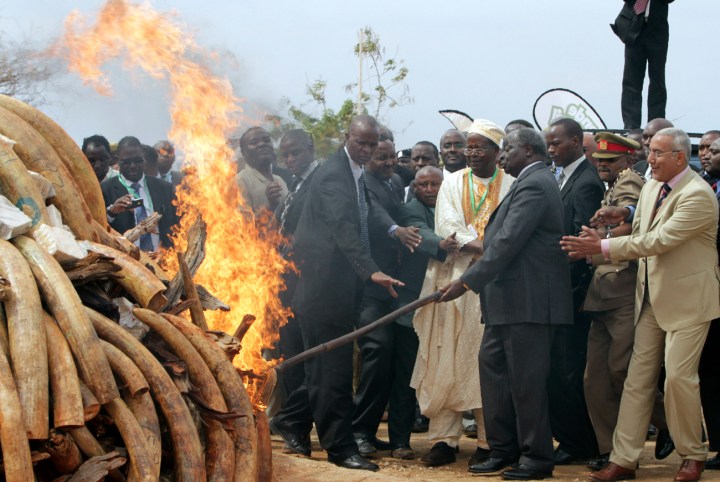Kenya’s President Mwai Kibaki only just managed to avoid singed eyebrows as he lit the flame which destroyed five tons of illegal ivory with a street value of more than R100 million. The booming Chinese middle-class watched in horror as thousands of potential decorative figurines went up in smoke, while Kenya’s neighbours suppressed their resentment at the country’s hardline stance against the lucrative ivory trade. By SIMON ALLISON.
Five tons of ivory makes for an impressive bonfire. Timed to mark the first ever African Elephant Law Enforcement Day – a strangely parochial commemoration given that the Asian elephant faces an even greater threat from poachers – the destruction of such a large and valuable stock of ivory sent a strong message to poachers, dealers and buyers who pose such a threat to the wellbeing of the world’s largest land mammals. Kibaki lit the paraffin-soaked pile of tusks and carvings – with the prevailing wind in his direction, the septuagenarian president had to quickly jump backwards to avoid the flames.
Poaching continues to endanger elephant populations, with authorities confiscating ivory taken from an estimated 2,600 elephants (of both geographical species) last year alone. It’s thought that a lot more of the precious substance evaded law enforcement and ended up in markets in Japan and China, where demand remains high. The market for ivory in China in particular has grown rapidly thanks to the country’s economic boom. Ivory figurines and ornaments are prized possessions and can sell for thousands of rands.
Kenya’s tough stance on poaching and ivory trading is nothing new and rooted in good economic logic. Tourism is a mainstay of the Kenyan economy bringing in nearly a billion dollars every year. To keep them coming, and spending, Kenya needs to do whatever it can to protect its wildlife. Even former president Daniel Arap Moi, despite his many faults, understood this principle – he lit the fuse on the last ceremonial ivory burning, in 1989, where 12 tons went up in smoke.
But on Wednesday, Kenya wasn’t only sending a message to poachers. The country was also celebrating last year’s political victory over its greedier – or perhaps just more short-sighted – neighbours, Tanzania and Zambia. The issue was ivory. Tanzania and Zambia both had lots of it; 21 and 90 tons respectively, huge reserves built up from culls and confiscations. And they want to sell. Zambia’s stocks would have netted the country somewhere in the region of $40 million. That’s a full third of what the country earns from tourism in a year; more than just a chunk of change.
But selling ivory is illegal. The trade is regulated by the Convention on International Trade in Endangered Species (Cites), whose 175 member states met in Doha last year to discuss the issue. Tanzania and Zambia proposed allowing a once-off sale of their ivory, arguing that there was no point in letting it go to waste and promising to plough all the profits back into conservation and development. Kenya, supported by Rwanda, took a tough stance against the proposed sales; they said that such a large dump of ivory on the Asian market (it was only ever going to be the Asian market) would merely pique interest and create more demand and thus more poaching. Their argument proved more persuasive, and the Tanzanian and Zambian proposal was rejected. This was despite the fact that the same international body had allowed four other African countries – Botswana, Namibia, South Africa and Zimbabwe – to sell some of their stock in special once-off sales after the Cites conference in 2007.
So the Tanzanian and Zambian stocks remain locked up in warehouses; as does the remaining 90% of Kenyan stock which was not burnt on Wednesday. This story’s far from over. The next Cites conference is in Thailand in March 2013, when there will be a new Kenyan government in power which might be in need of a short-term cash injection – and an even bigger Chinese middle-class who will pay even more for some pretty ornaments.
One way or another, for now, Kenya is determined to take poachers to tusk and it deserves all the help it can get. DM
Kenya’s President Mwai Kibaki (C) sets alight five tonnes worth of Ivory during the African Elephant Law Enforcement Day in Tsavo West National Park, 380 km (236 miles) east of capital Nairobi July 20, 2011. The confiscated consignment, recovered from smugglers in Singapore in 2002, originated from poaching activities in both Zambia and Malawi, government officials said. REUTERS/Noor Khamis



















 Become an Insider
Become an Insider